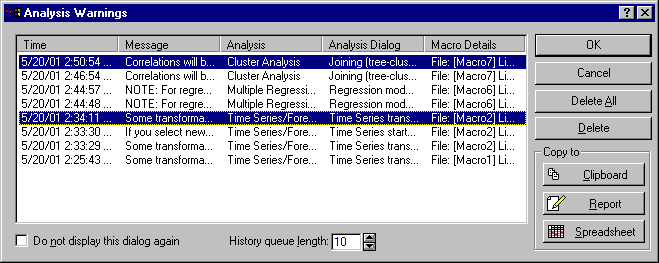Non-Fatal Errors (Warnings) that Occur
In many instances throughout interactive analyses, you may receive non-fatal error (warning) messages, for example, to inform you that some missing data were replaced by means, that some variables were dropped from the analyses, that some parameters were reset, etc. Usually, these warning will not require that the respective analyses be terminated, but the information provided in these warnings may be important for the user to be aware of.
When such warning messages occur during the execution of an SVB program, the Analysis Warnings dialog box will by displayed containing the warnings that have occurred, when they occurred (the time and in which specific analysis), the approximate line numbers in the SVB program code where the warnings occurred, etc; if the respective non-fatal error, when it occurred during the interactive analysis, required some user response (e.g., Yes/No in response to a question whether or not to continue), then that user input is also shown in the Message field.
You can use this dialog box to manage the warnings that occurred during your current "session" with Statistica (running SVB programs). Note that the warnings are collected across multiple analyses, and you can at any time create a report of these analysis, send them to a spreadsheet (so you can write SVB code to further process these messages), etc.
The GetAnalysisErrorReport method. When running Statistica analyses via Visual Basic from another application (e.g., from inside MS Excel), it can be desirable to deal with the warnings inside the other applications without displaying any Statistica specific dialog boxes. For example, you may want to place the warning messages into particular cells of a Microsoft Excel spreadsheet. For that purpose, the Application object of Statistica (see Statistica Object Model) contains a specific method:
Function GetAnalysisErrorReport( _
[MakeVisible As Boolean = True]) As Spreadsheet
You can retrieve all information regarding non-fatal errors (warnings) that occur during a Statistica analysis into a Spreadsheet object; you can then apply all the standard Spreadsheet methods and properties to retrieve the desired information for display in the Excel spreadsheet.


